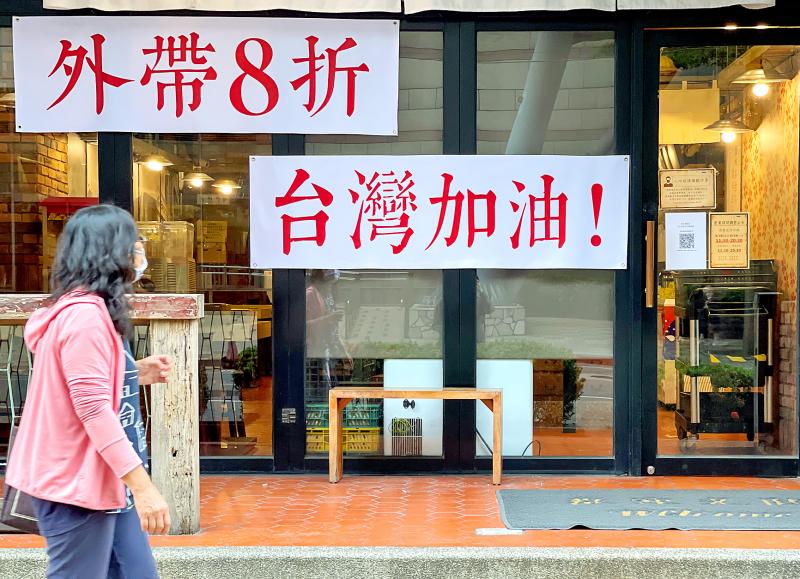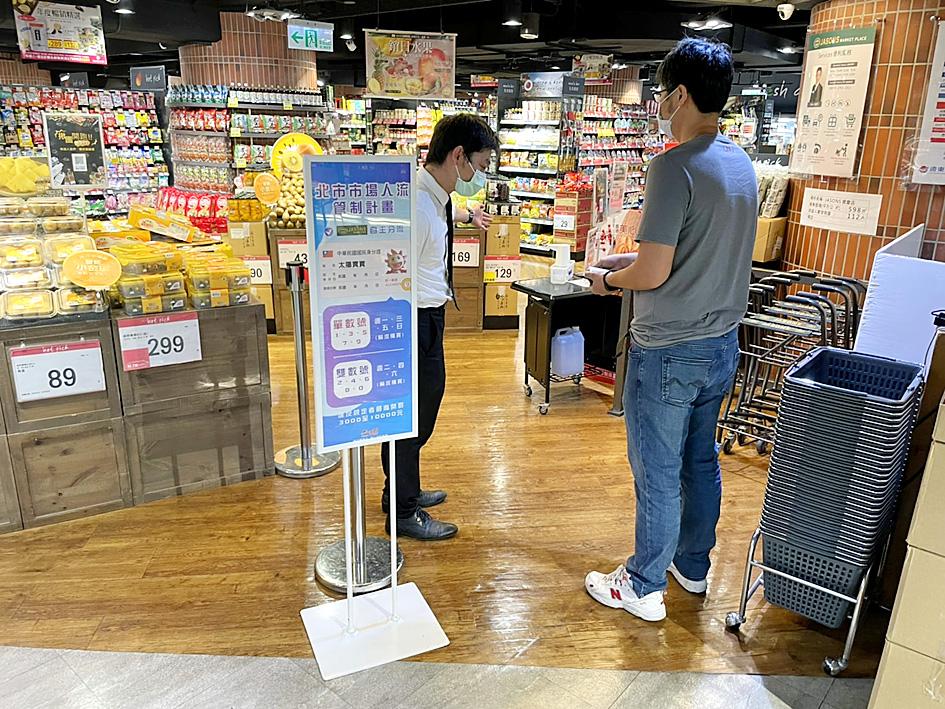The Central Epidemic Command Center (CECC) yesterday announced principles for controlling COVID-19 at supermarkets, convenience stores and other retail outlets, while issuing revised guidance for companies with migrant workers.
The center said that the nationwide level 3 COVID-19 alert would be extended until June 28, meaning that existing disease prevention measures would continue to be enforced, while some enhanced measures would also be implemented.
“The ministry instructs supermarkets, convenience stores, department stores and other shops to thoroughly implement crowd control,” Deputy Minister of Economic Affairs Chen Chern-chyi (陳正祺) said. “We also urge people to buy more per visit and go shopping less often.”

Photo: CNA
Three principles of COVID-19 prevention and control are to be implemented at retail venues, he added.
The first principle is “crowd control,” including clear business hours and a maximum number of people allowed in the store, going by the rule of one person per ping (3.305m2), Chen said.
An employee should be tasked with enforcing a “one in, one out” policy when there are many customers to keep the number below the maximum, and customers should be instructed to practice social distancing inside and outside the store, he said.

Photo courtesy of City’super
The second principle is “entry and exit control,” Chen said.
Stores are encouraged to designate separate entry and exit points, provide alcohol-based sanitizer for customers’ hands, and position employees at entrances to ensure that people register their contact information, have their temperature taken and wear a mask.
The third principle is increased disinfection of store spaces, especially customer restrooms, escalators, elevators, seats, nursery rooms and surfaces more frequently touched by customers, Chen said.
Deputy Minister of Labor Wang An-pang (王安邦) said that while prevention guidelines have already been issued to companies with migrant workers, a few points have been revised.
If an employee is diagnosed with COVID-19, the person’s close work contacts must immediately be identified and placed under home isolation in single rooms with private bathrooms, he said.
If the infected person works at a company with more than one factory site, migrant workers who are not infected and are at the other sites must not be moved to the infected person’s production line or dormitory, Wang said.
Company personnel should be assigned to monitor the infected workers’ health daily, and arrange for those with COVID-19 symptoms to be placed in isolation and tested, he added.
The Ministry of Labor expects to finish inspecting migrant workers’ dormitories at the 1,168 companies that have 50 or more foreign workers by Thursday, Wang said.
It is also allocating funds so that it can offer subsidies to companies that reduce the number of migrant workers per dormitory room by moving some of them to other buildings, hotels or quarantine hotels, he said.
A care center has been established to provide services for migrant workers of King Yuan Electronics, Wang said.
The CECC on Sunday ordered that migrant workers at King Yuan Electronics suspend work and be placed in home isolation, after 195 infections, mostly migrant workers at its factories in Miaoli County, were confirmed.
Translators have been recruited by the center to assist in communicating with the migrant workers, Wang said, adding that they would receive regular care service calls in their native language and receive disease prevention supplies.
The ministry also has Line accounts (LINE@移點通) for sharing government policies and other information with migrant workers in four languages: Indonesian (@1955mw_id), Vietnamese (@1955mw_vn), Thai (@1955mw_th) and English (@1955mw_ph), he said, adding that migrant workers are encouraged to follow the accounts to better understand the latest COVID-19 control policies.

DEFENSE: The National Security Bureau promised to expand communication and intelligence cooperation with global partners and enhance its strategic analytical skills China has not only increased military exercises and “gray zone” tactics against Taiwan this year, but also continues to recruit military personnel for espionage, the National Security Bureau (NSB) said yesterday in a report to the Legislative Yuan. The bureau submitted the report ahead of NSB Director-General Tsai Ming-yen’s (蔡明彥) appearance before the Foreign and National Defense Committee today. Last year, the Chinese People’s Liberation Army (PLA) conducted “Joint Sword-2024A and B” military exercises targeting Taiwan and carried out 40 combat readiness patrols, the bureau said. In addition, Chinese military aircraft entered Taiwan’s airspace 3,070 times last year, up about

A magnitude 4.3 earthquake struck eastern Taiwan's Hualien County at 8:31am today, according to the Central Weather Administration (CWA). The epicenter of the temblor was located in Hualien County, about 70.3 kilometers south southwest of Hualien County Hall, at a depth of 23.2km, according to the administration. There were no immediate reports of damage resulting from the quake. The earthquake's intensity, which gauges the actual effect of a temblor, was highest in Taitung County, where it measured 3 on Taiwan's 7-tier intensity scale. The quake also measured an intensity of 2 in Hualien and Nantou counties, the CWA said.

The Overseas Community Affairs Council (OCAC) yesterday announced a fundraising campaign to support survivors of the magnitude 7.7 earthquake that struck Myanmar on March 28, with two prayer events scheduled in Taipei and Taichung later this week. “While initial rescue operations have concluded [in Myanmar], many survivors are now facing increasingly difficult living conditions,” OCAC Minister Hsu Chia-ching (徐佳青) told a news conference in Taipei. The fundraising campaign, which runs through May 31, is focused on supporting the reconstruction of damaged overseas compatriot schools, assisting students from Myanmar in Taiwan, and providing essential items, such as drinking water, food and medical supplies,

New Party Deputy Secretary-General You Chih-pin (游智彬) this morning went to the National Immigration Agency (NIA) to “turn himself in” after being notified that he had failed to provide proof of having renounced his Chinese household registration. He was one of more than 10,000 naturalized Taiwanese citizens from China who were informed by the NIA that their Taiwanese citizenship might be revoked if they fail to provide the proof in three months, people familiar with the matter said. You said he has proof that he had renounced his Chinese household registration and demanded the NIA provide proof that he still had Chinese